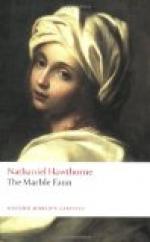And now the broad valley twinkled with lights, that glimmered through its duskiness like the fireflies in the garden of a Florentine palace. A gleam of lightning from the rear of the tempest showed the circumference of hills and the great space between, as the last cannon-flash of a retreating army reddens across the field where it has fought. The sculptor was on the point of descending the turret stair, when, somewhere in the darkness that lay beneath them, a woman’s voice was heard, singing a low, sad strain.
“Hark!” said he, laying his hand on Donatello’s arm.
And Donatello had said “Hark!” at the same instant.
The song, if song it could be called, that had only a wild rhythm, and flowed forth in the fitful measure of a wind-harp, did not clothe itself in the sharp brilliancy of the Italian tongue. The words, so far as they could be distinguished, were German, and therefore unintelligible to the Count, and hardly less so to the sculptor; being softened and molten, as it were, into the melancholy richness of the voice that sung them. It was as the murmur of a soul bewildered amid the sinful gloom of earth, and retaining only enough memory of a better state to make sad music of the wail, which would else have been a despairing shriek. Never was there profounder pathos than breathed through that mysterious voice; it brought the tears into the sculptor’s eyes, with remembrances and forebodings of whatever sorrow he had felt or apprehended; it made Donatello sob, as chiming in with the anguish that he found unutterable, and giving it the expression which he vaguely sought.
But, when the emotion was at its profoundest depth, the voice rose out of it, yet so gradually that a gloom seemed to pervade it, far upward from the abyss, and not entirely to fall away as it ascended into a higher and purer region. At last, the auditors would have fancied that the melody, with its rich sweetness all there, and much of its sorrow gone, was floating around the very summit of the tower.
“Donatello,” said the sculptor, when there was silence again, “had that voice no message for your ear?”
“I dare not receive it,” said Donatello; “the anguish of which it spoke abides with me: the hope dies away with the breath that brought it hither. It is not good for me to hear that voice.”
The sculptor sighed, and left the poor penitent keeping his vigil on the tower.
CHAPTER XXX
DONATELLO’S BUST
Kenyon, it will be remembered, had asked Donatello’s permission to model his bust. The work had now made considerable progress, and necessarily kept the sculptor’s thoughts brooding much and often upon his host’s personal characteristics. These it was his difficult office to bring out from their depths, and interpret them to all men, showing them what they could not discern for themselves, yet must be compelled to recognize at a glance, on the surface of a block of marble.




